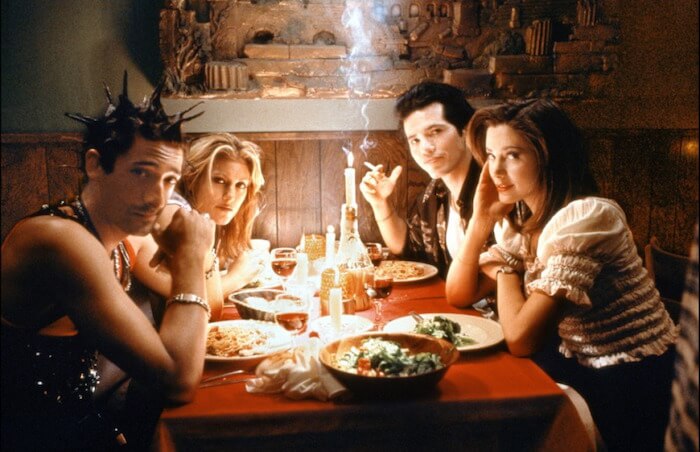The Best Old Movies on a Big Screen This Week: NYC Repertory Cinema Picks, June 29-July 5

Summer of Sam (1999)
Directed by Spike Lee
Spike Lee is the best New York director of the later 20th century, because his stories of the city aren’t limited to the neighborhood where he lives or grew up—they breathe with a life that belongs to the city itself, to its every corner and citizen. Woody Allen’s movies, great as many are, are about Woody Allen-like people who live in Woody Allen’s neighborhoods; Scorsese used to make movies about his paisans. It’s not that Lee has no identity; his movies are often concerned with ethnic and racial tribalisms that define neighborhoods—and the ways they conflict, as in Do the Right Thing—but he’s not confined to his own milieu. He can make a movie about the Fort Greene artists and professionals of She’s Gotta Have It or the native Bay Ridge Irish of 25th Hour; the whole city is his bailiwick. He’s at his most invigorating in scenes like those in Inside Man during which hostages argue about baseball, one of those languages the whole city speaks.
Scorsese and Allen are also, not coincidentally, Manhattancentric, whereas Lee shows a knowledge of the outerboroughs worthy of David Berkowitz, who especially terrorized the city because, for fuck’s sake, not even Bath Beach was far enough to be safely off his radar. Lee kinda steps on Scorsese’s toes in his chronicle of the Berkowitz era, Summer of Sam. It’s focused on a group of Italians in and around Morris Park, the Bensonhurst of the Bronx, but it’s inclusive, full of homos, hairdressers, hustlers, hoods, crooners, dealers, mafiosi and greasy-spooned Greeks. (There’s, like, one scene in Bed–Stuy, but that’s it!) It almost seems to mock Mean Streets. The two leads, John Leguizamo and Adrian Brody, playing Italian–Americans, don’t fit anyone’s idea of the type, even if Leguizamo has some distant Italian heritage; Saverio Guerra has the DeNiro role, meaning he wears a doofy hat and looks high; and Leguizamo’s spiritual “crises”—he keeps cheating on his wife, because he needs anal sex, and it’s not Catholic to fuck your wife in the ass—are practically played for laughs.
It’s like Moonstruck meets Zodiac, a cartoony account of a serial killer’s effect on the larger culture. If you’re looking for something dark and cool, look elsewhere, because that’s not Lee’s style. If he made a movie about a taxi driver, the cabbie wouldn’t be some brooding psychopathic killer! This movie is bouncy and silly, with lots of sex, unfortunately or inevitably interrupted by violence and death. Many of the camera angles look out of EC Comics; the colors pop with similar intensity. Even the scenes with Berkowitz are outlandish, with screaming organ chords (the score is by Terence Blanchard) and a talking dog (voiced by John Turturro). This is how Spike Lee sees New York, a wacky town where the good comes with the bad, the party with the bloodshed.
Still, Summer of Sam isn’t flippant. Berkowitz’s sanity breaks down; Leguizamo’s marriage breaks down; New York breaks down. A contagious temporary madness sweeps through the five boroughs, through the power grid itself, during the heatwave, blackout and serial killings that gripped the city in the hottest months of 1977. Echt New Yorker Jimmy Breslin, playing himself, appears in bookending segments. (The first introduces us to a New York very different from Giuliani’s second term, when the film was released.) Both times he calls New York “the city I love and hate equally.” This sentiment is what Lee understands better than his contemporaries: New York is like family. Henry Stewart (July 3, 7:30pm at Metrograph’s “Summer in the City”)
You might also like 



















